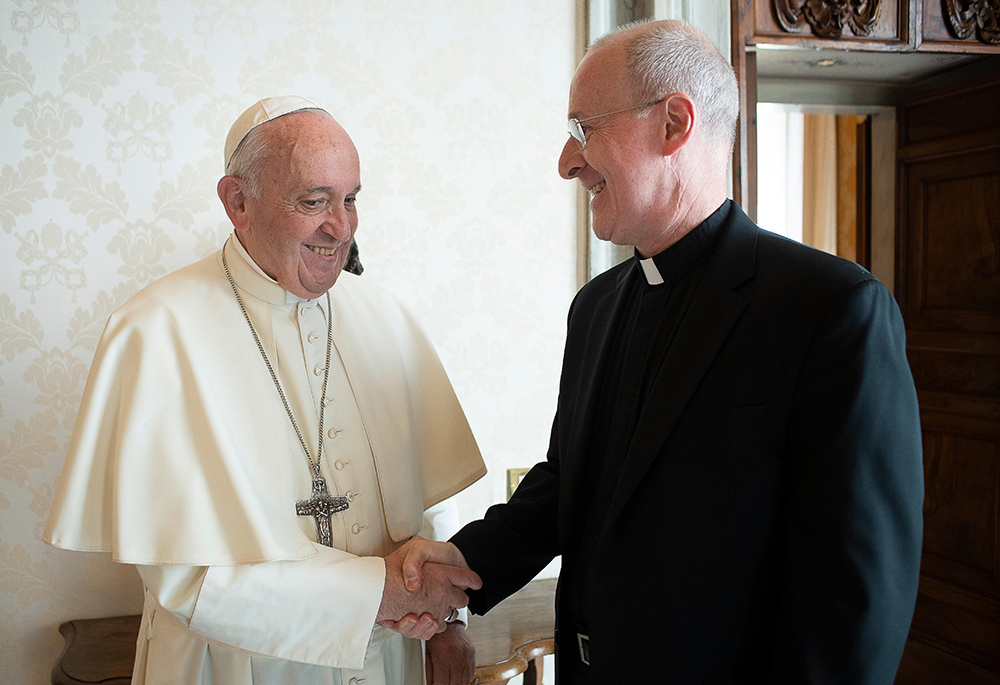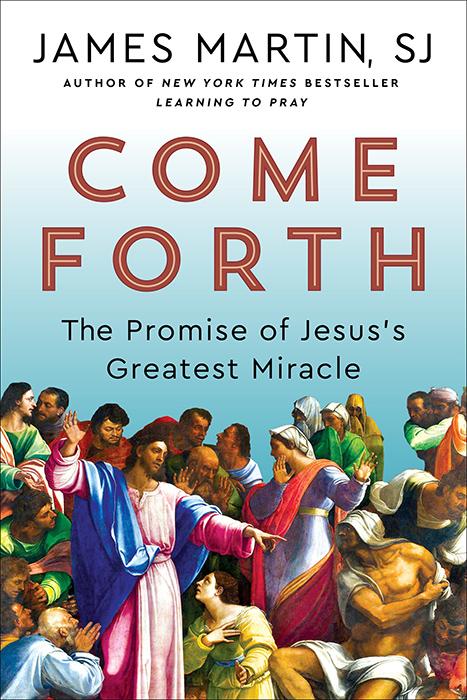
Pope Francis greets Jesuit Fr. James Martin, author and editor at large of America magazine, during a private meeting at the Vatican in this Oct. 1, 2019, file photo. (CNS/Vatican Media)
Pope Francis has written a preface for the Italian edition of Come Forth: The Promise of Jesus's Greatest Miracle, a book by Jesuit Fr. James Martin. Originally published in the U.S. in September 2023, Martin's work delves into the story of the resurrection of Lazarus, which he dubs "Jesus's greatest miracle." The pope's preface not only highlights the themes of the book, but also offers a glimpse into his own theological and pastoral perspectives.
"I was surprised, delighted and of course very grateful. It was completely unexpected, to be honest. And I was also moved by what the Holy Father wrote. His preface is a kind of mini-tutorial on how to read the Bible, so it goes beyond even the story of Lazarus," Martin told NCR in an interview.

Cover of Come Forth: The Promise of Jesus's Greatest Miracle, by Jesuit Fr. James Martin, published by HarperOne, an imprint of Harper Collins Publishing (OSV News/Courtesy of HarperOne)
In his preface titled "All of us are Lazarus," Francis commended Martin for making the biblical text come alive, saying he analyzed it "with the eyes and erudition of a diverse set of writers who have probed this passage deeply, capturing their many facets, emphases, and interpretations."
Central to both Martin's book and the pope's preface is the metaphor of Lazarus as a representation of all humanity, and how humanity can save itself from both real and metaphorical death only if it enters into a direct relationship of love and friendship with the divine. It is precisely with regard to this loving relationship that the pope invited readers to treat the Bible as a "love letter." Martin said this is the passage that resonated with him the most.
"Of course, I've always understood the Bible to be the inspired word of God or, even more, the living word, telling the story of God's relationship with humanity, often called 'salvation history.' But all those ways of understanding it are quite theological," Martin said. "Seeing it as a 'love letter' brings the Bible down to earth, as it were, and reminds us that it is, in the end, all about love."
The preface also touched on the "concrete and eternal" relevance of the Gospel. Francis pointed out that the Gospel's message is as vital today as it was in the time of Jesus. He asserted that Christianity is a blend of the eternal and the contingent, the divine and the human, and this duality is what makes it unique.
Advertisement
Francis also drew a connection between contemporary literature and theological reflection, citing Cormac McCarthy's contemplation on forgiveness in Cities of the Plain, and aligning it with the Christian understanding of God's nature.
"One of the characters in Cities of the Plain (1998) says: 'He believed in God even if he was doubtful of men's claims to know God's mind. But that a God unable to forgive was no God at all.' That's exactly right: God's 'job' is to forgive," Francis noted.
In his conclusion, Francis reflected on the paradox of life and death, drawing from both Martin's insights and the reflections of other theologians. He quoted Fr. Alberto Maggi, an Italian Bible scholar, who is among the most active priests in Italy in advocating for full inclusion of LGBTQ+ Catholics in the church, saying, "What Jesus teaches us with this miracle is not so much that the dead rise, but that the living do not die!" This, the pope suggested, is the core message of the resurrection: the promise of eternal life that begins here and now, transcending the physical death.
"The message of Come Forth is that God asks us to leave behind in our 'tombs' anything that keeps us unfree, so that we may hear God's voice inviting us into new life, just as Jesus did for Lazarus," Martin said. "And I've heard from many readers [in person and online] that the book has helped them identify parts of their lives that need to 'die,' and, more importantly, that they've been encouraged to look for the places where God is offering them new life. That's been very gratifying."








